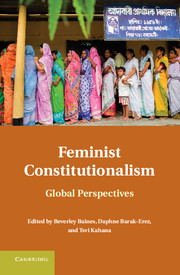Book contents
- Frontmatter
- Contents
- Foreword
- Contributors
- Introduction
- Part I Feminism as a Challenge to Constitutional Theory
- Part II Feminism and Judging
- Part III Feminism, Democracy, and Political Participation
- Part IV The Constitutionalism of Reproductive Rights
- 14 Pregnancy, Equality, and U.S. Constitutional Law
- 15 Federal Spending and Compulsory Maternity
- 16 Challenges for Contemporary Reproductive Rights Advocacy
- Part V Women's Rights, Multiculturalism, and Diversity
- Part VI Women between Secularism and Religion
- Index
- References
14 - Pregnancy, Equality, and U.S. Constitutional Law
Published online by Cambridge University Press: 05 June 2012
- Frontmatter
- Contents
- Foreword
- Contributors
- Introduction
- Part I Feminism as a Challenge to Constitutional Theory
- Part II Feminism and Judging
- Part III Feminism, Democracy, and Political Participation
- Part IV The Constitutionalism of Reproductive Rights
- 14 Pregnancy, Equality, and U.S. Constitutional Law
- 15 Federal Spending and Compulsory Maternity
- 16 Challenges for Contemporary Reproductive Rights Advocacy
- Part V Women's Rights, Multiculturalism, and Diversity
- Part VI Women between Secularism and Religion
- Index
- References
Summary
A recurring problem in sex equality law is the law's tendency to treat men's experiences as the norm and women's as the exception. In one context, however, U.S. constitutional law does the opposite: U.S. Supreme Court precedent treats pregnancy as the prototype – the norm – for constitutionally protected parental rights. The Court's model of pregnancy as a parental relationship was developed in the context of adjudicating the rights of unwed fathers, but it can be generalized to develop a broad feminist theory of reproductive freedom that encompasses a woman's full range of reproductive decisions, from abortion to parenting. This chapter develops that theory in two contexts: surrogacy contracts and the right to abortion.
When the U.S. Supreme Court first confronted the parental claims of unwed fathers, it declined to fully embrace the patriarchal view that a man's “seed” establishes rights over any child made with that seed. Instead, the Court developed a test for parental rights that encompassed both a biological tie and a caretaking relationship. Pregnancy was the model for this test. The unwed father precedents therefore suggest that the woman who gives birth to a child has a caretaking relationship with the child and should be recognized as the child's “constitutional parent.” In surrogacy arrangements, the separation of genetic and gestational motherhood challenges this conceptual scheme. Nonetheless, the result should be the same: the woman who gives birth to the child should have constitutionally protected parental rights.
- Type
- Chapter
- Information
- Feminist ConstitutionalismGlobal Perspectives, pp. 263 - 280Publisher: Cambridge University PressPrint publication year: 2012



